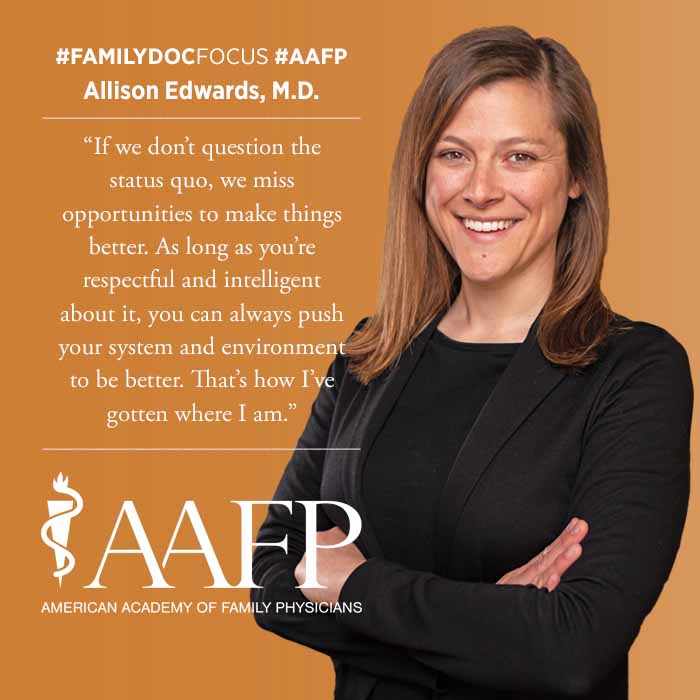FP Is Taking a Direct Approach to Making Things Better
April 15, 2019 11:40 am David Mitchell – Allison Edwards, M.D., recently had an opportunity to spend time with two of her mentors from the University of Colorado Family Medicine Residency. Nearly three years after completing her training, she expressed remorse.
"I apologized profusely to them for being pushy, grumpy and agitating during residency," Edwards said. "They laughed and said that I was an agitator, but I was an agitator with a vision. I always had my next step planned out. That's how I think; I complain for sport. I find it to be fun. I'm like the old man on his porch yelling at kids to get off his lawn."
At 32, Edwards is nowhere near ready for a rocking chair. Instead, her passion and outspoken nature have led to opportunities to share her views early in her career.
"If we don't question the status quo, we miss opportunities to make things better," she said. "As long as you're respectful and intelligent about it, you can always push your system and environment to be better. That's how I've gotten where I am."
Edwards, a direct primary care (DPC) practice owner in Kansas City, Kan., will be a featured speaker June 28 and 29 during the Direct Primary Care Summit in Chicago and July 25 during the National Conference of Family Medicine Residents and Medical Students in Kansas City, Mo.

Edwards, who served on the planning committee for the DPC event, will be a panelist during a session about starting a DPC practice right out of residency, which she did a little more than two years ago. She also will be the speaker in a session regarding data collection in DPC practices.
She hopes the latter presentation will start a conversation in the DPC community about creating metrics that actually measure quality of care. Edwards said most DPC practices are using electronic health records that report data based on fee-for-service systems that have not been shown to improve outcomes.
DPC has the potential to enhance patient satisfaction through improved access and lower costs while boosting physician satisfaction by removing or reducing the involvement of third-party payers. But how do DPC outcomes compare to those of traditional fee-for-service practices?
"I believe I'm doing what's best for my patients, but I can't prove it," Edwards said. "In direct primary care, we have a blank canvas. It's our responsibility with this fresh start to figure out what we should be measuring and what we should be asking of our software. You can't say you've created a better system if you don't have empirical data that suggest that."
Edwards decided to start her own DPC practice after her time with patients during residency was limited to 12 minutes per visit. She will tell that story during National Conference.
"I'm excited to share my journey in family medicine," said Edwards, who also works locums shifts at rural hospitals on weekends and volunteers at a free clinic affiliated with her alma mater, the University of Kansas Medical School. "Family medicine can be almost anything you want because the opportunities are so wide and varied. You have to be able to push yourself and put yourself in positions that you might not have thought about at the start of your training."